Natural Homemade Dish Soap That Works
This post may contain affiliate links. Read disclosure policy.
This natural homemade dish soap recipe is so easy to make, smells wonderful, works amazingly well, saves you money, and is environmentally friendly. How much better can it get? Not only will it cut through grease, but it’s safe for you and your family.
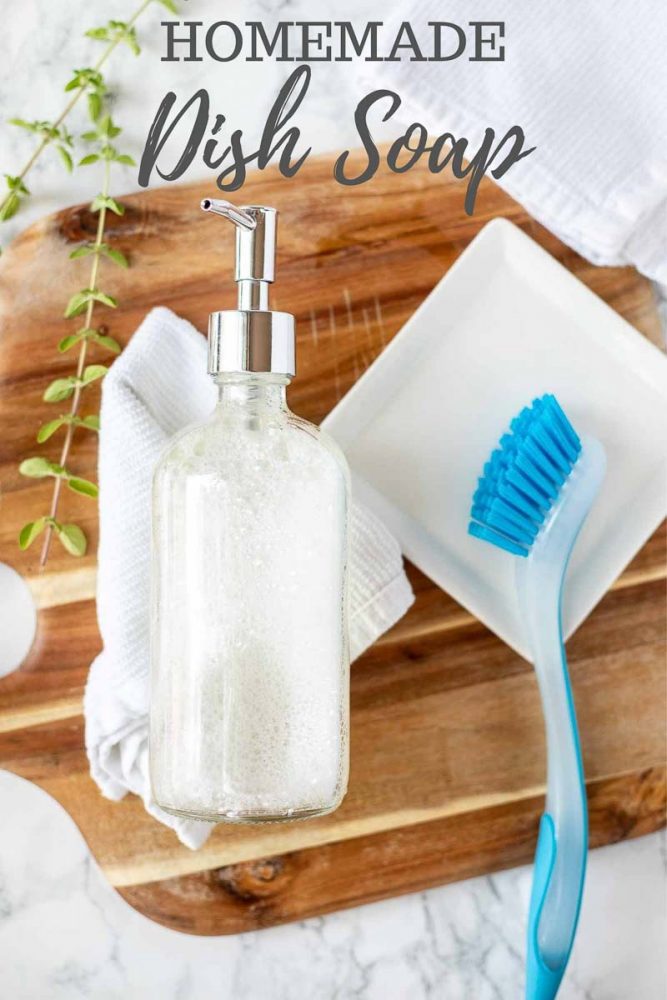
This natural dish soap is a new twist on a very old recipe on the blog.
I did some tweaking to fix some problems that were coming up, and the new results are so much better! No more grating a bar soap with inconsistent results.
So many people find that homemade cleaners don’t work as well as their chemical counterparts, but I can assure you that this one works well.
It’s tough on grease and suds up amazingly well, making it easy to enjoy this natural switch.
It is also cheaper than typical, natural dish soaps, which usually cost around $4 per 25 oz. This one will set you back around $3. So, slightly cheaper.
It also has a better rating from the EWG website. I’ve tried a few of the store-bought, natural dish soap options, and I find them to be disappointing, and you need a lot of it for it to work.
However, I still love to use the store-bought options in this really effective DIY Stain Remover.
We’ve loved this natural DIY dish soap recipe in our house. Getting used to the consistency takes a little adjustment, and you don’t have to use very much for great results.
I promise you, this recipe works great, and your dirty dishes will become remarkably clean.
Why you will love this recipe:
Actually works: Greasy dishes stand no chance with this homemade version.
Natural ingredients: Commercial dish soap contains many harmful ingredients that are known endocrine disruptors like fragrance. When it comes to finding a natural store-bought dish soap, I like to check the EWG (environmental working group) website to see the healthiest options. Transitioning to natural cleaning products is a great way to reduce your exposure to harmful chemicals and create a healthier home environment.
Easy: The good news is making your own homemade dish soap is way easier than you think. Using a liquid soap like sal suds, makes this process much easier. No grating, boiling down ingredients, mixing for long periods or using special equipment (like an immersion blender).
Eco-friendly: Not only will you reduce your environmental impact by cutting down on plastic packaging, but also contribute to a more eco-friendly cleaning routine for a healthier planet and home.
Customizable: Making your own dish soap also allows you to customize the scent and strength of the soap to suit your preferences and cleaning needs.
Cost effective: More cost-effective option in the long run, as many of the ingredients needed are often pantry staples or easily accessible at local stores.
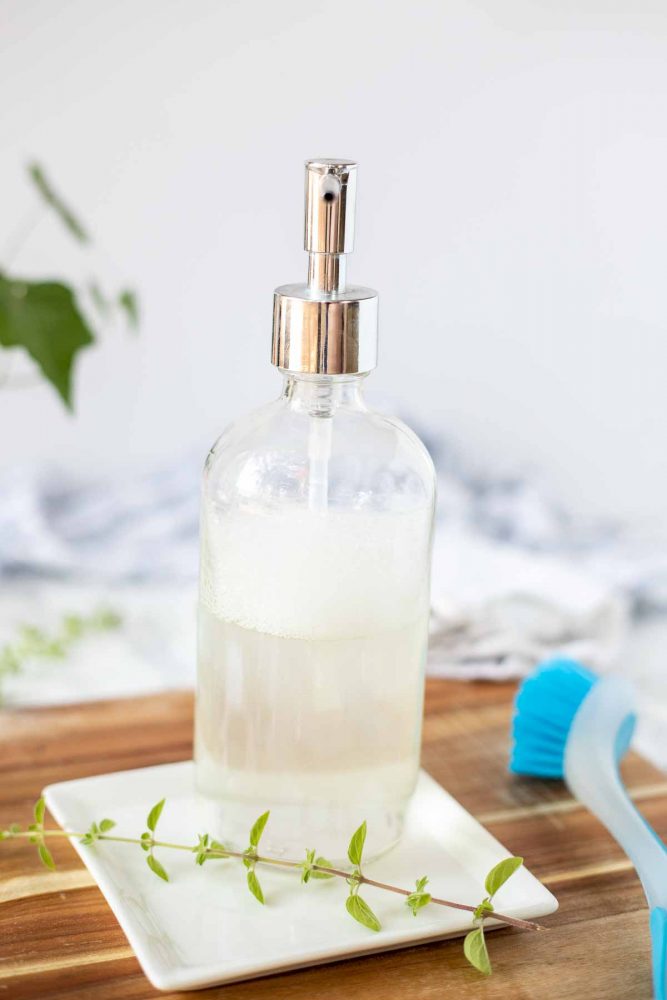
Tips:
- The consistency is much thinner than regular dish soap, and a little bit goes a long way. Just because it is runny doesn’t mean it is ineffective.
- You can place it in a soap pump, foaming soap pump, or just put it in an old, dish soap bottle.
- You may have to shake it up a little before you use it, but it shouldn’t clump and separate like the last recipe!
- Don’t substitute the sal suds for liquid castile soap. Since this recipe contains vinegar, it will not work with castile soap.
The following are affiliate links. We are a participant in the Amazon Services LLC Associates Program and other affiliate programs that are designed to provide a means for us to earn fees by linking to Amazon.com and affiliated sites.
Tools you may need:
Measuring spoons
Spoon
Soap dispenser. A foaming pump dispenser works the best. I like to use a glass rather than plastic bottles when using essential oils, because oils can break down the plastic.
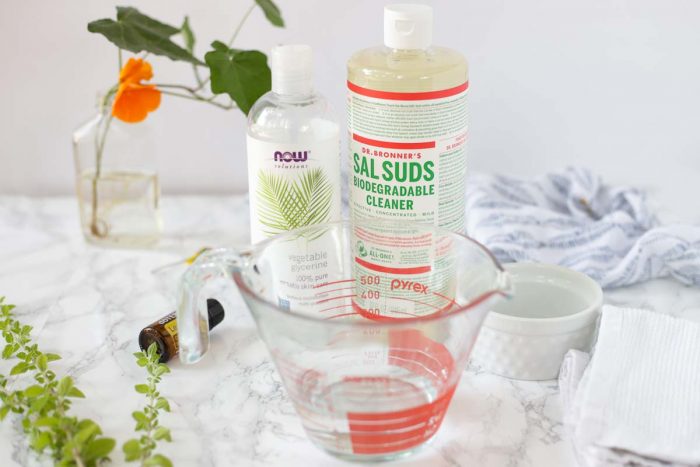
The Ingredients:
- Dr. Bronner Sal Suds – This is like the ultra-concentrated, cleaning power of Castile soaps (which is a staple in any natural-living cabinet, hello, hand soap). This mild detergent is powerful and works amazingly well to clean dishes without any soap scum or residue. It can also be used to clean floors, counters, laundry, and more. It also works great in hard water (something we struggle with here at our house).
- Some people don’t like the fact that it contains sodium lauryl sulfate, and believe it to be carcinogenic. According to the company, it is a processed ingredient made from coconut that studies find have no carcinogenic effects (source).
- This is also different from castile soap, which doesn’t work very well for cleaning (and can’t be used in conjunction with vinegar, which this recipe contains). Castile soap is a soap that is meant to be used for personal care and better for your skin, while sal suds is a mild detergent.
- Water – I would recommend using distilled water or water that was boiled and cooled to help reduce the chance of bacterial growth.
- Vinegar – Helps cut grease and provides a streak-free shine.
- Vegetable glycerin (optional) – This helps create more sudsing power and helps moisturize your hands.
- Your favorite essential oils (optional): Twenty drops of your favorite essential oils. Ones used specifically for cleaning are my favorite. This is citrus oils, pine, tea tree, spruce essential oil, etc.
Essential Oils
Essential oils not only add a pleasant scent to your dish soap, but also offer additional cleaning and antibacterial properties.
Save This Recipe
Lemon essential oil or citrus essential oil. One of my favorites to add since citrus oils work great as a degreaser to get those dishes squeaky clean.
Other essential oils have antibacterial properties. Optional: 10-20 drops of On-Guard, Thieves, or tea tree oil (anti-bacterial; if you like the smell you can add more, if not, add less). You can really play around with different essential oils to find your favorite.
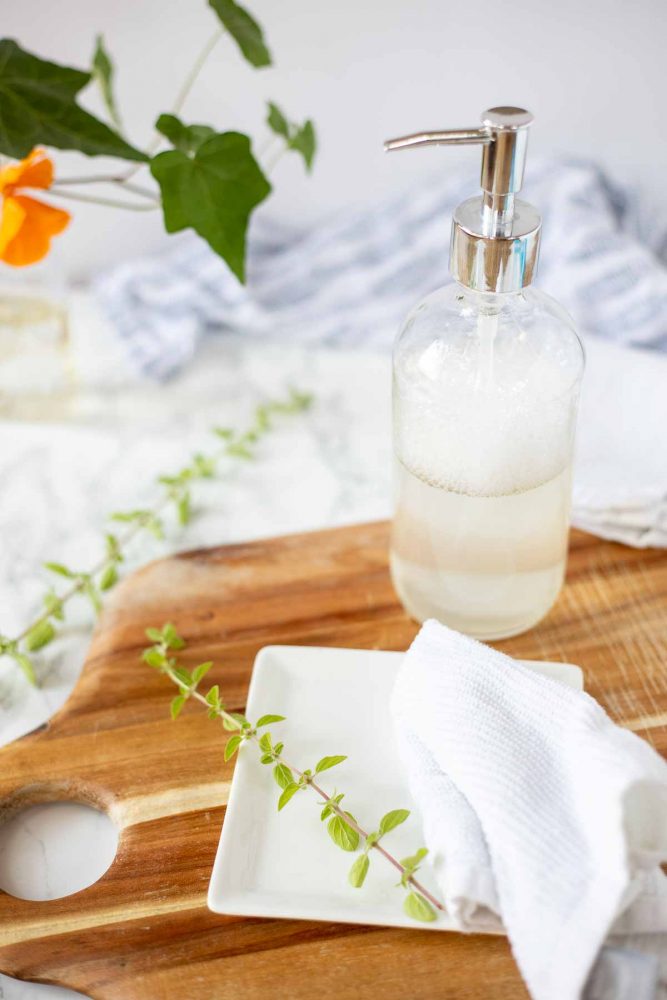
How To Make Natural Homemade Dish Soap:
If not using distilled water, bring water to a boil for a few minutes and then let it cool down a bit before starting the next step.
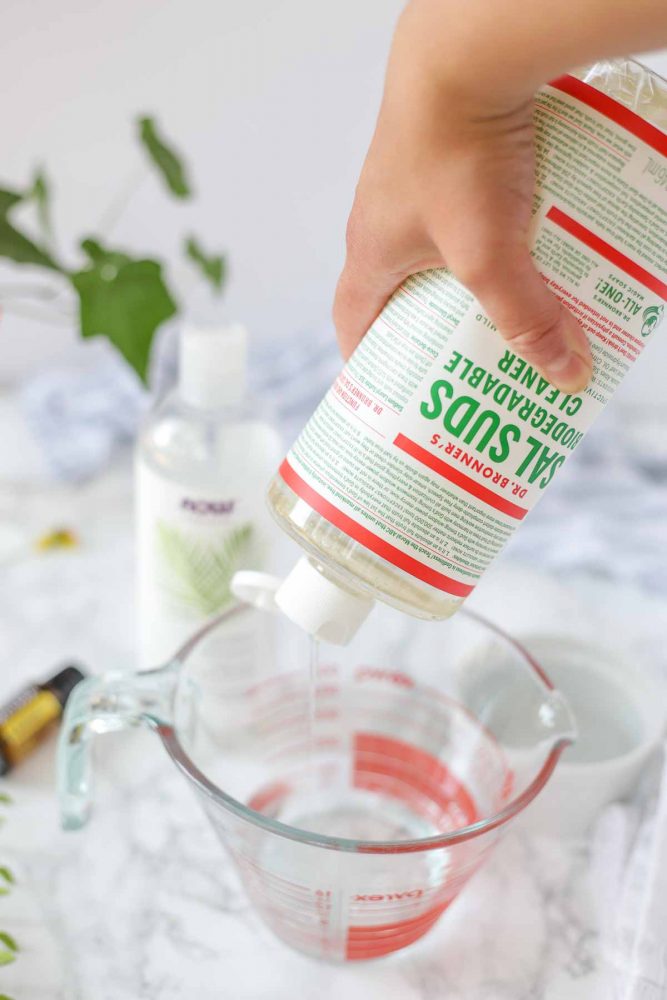
n a medium-sized bowl, combine all of the ingredients and stir well.
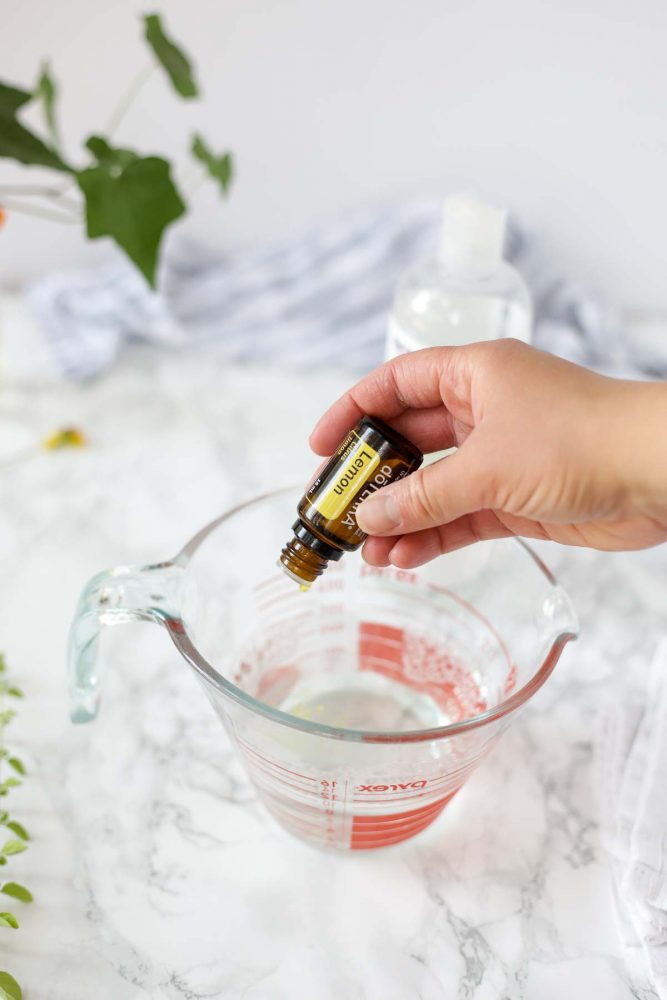
Add 20 drops of essential oil. I like to use citrus oils, like lemon, because it is tough on grease. You can also use anti-bacterial type oils like On-Guard or Thieves. Tea tree would also work well.
Pour homemade soap into a foaming soap dispenser. You can also use mason jars or another container, but a foaming dispenser is what I found to work the best.
That’s it! Wasn’t that easy? You do like two minutes of work and you’re done.
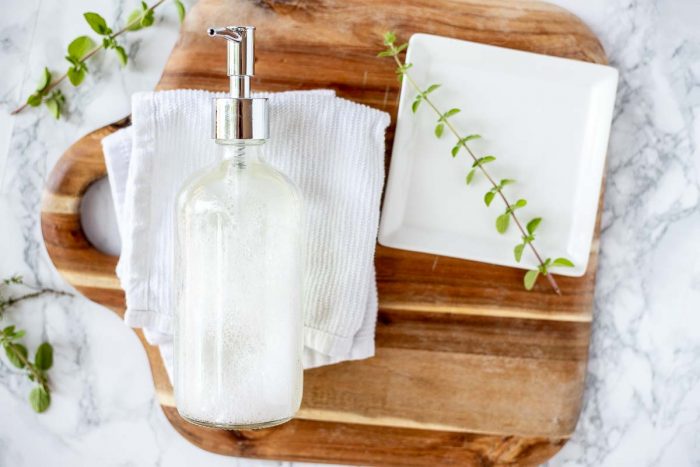
Variations:
Citrus: Add 20 drops of lemon, grapefruit, mandarin, etc.
Lavender mint: One of my favorite combos adds about 15 drops of lavender and 5 drops of peppermint.
Holiday: I love Christmas tree smells with pine, Siberian fir, Douglas fir, etc. Or that classic holiday smells of clove, cinnamon, orange, and Douglas fir.
Herbal mint: Add mint (or spearmint) and eucalyptus.
Tips For Using This DIY Dish Soap
- Be sure to shake the bottle before each use to ensure the ingredients are well mixed.
- When washing dishes, use a small amount of soap as a little goes a long way with these concentrated formulas.
- For tough grease or baked-on food, allow the soap to sit on the dishes for a few minutes before scrubbing.
- Additionally, consider using a natural bristle brush or sponge to help with scrubbing power without scratching delicate dishes. After washing, be sure to rinse thoroughly to remove any soap residue (luckily sal suds are very biodegradable and have been approved for gray water systems).
FAQ
You can in a pinch, but I would recommend this foaming hand soap to use instead because it is much more gentle on your hands.
Or this natural hand sanitizer while you’re out and about.
Vinegar alone can not replace dish soap because it does not break down fats like soap will.
Hand soaps usually contain other ingredients that will leave residue on your dishes like skin softeners and fragrances. They will not rinse off leaving a bad taste in your mouth.
Yes you can, but I found it not a super effective dish detergent. Dishes would still have grease or residue left after using it. Sal suds is a much more effective cleaner for dishes.
Would I be in a pinch if I had nothing else? Yes I would.
Find More Homemade Cleaning Products That Work!
- All-Purpose Cleaner (that can also be used on glass!)
- DIY Furniture Polish
- Homemade dishwasher detergent
- Glass-Cleaner
- Homemade Laundry Detergent
- 15 House Cleaning Tips For A Naturally Clean Home
- Homemade Granite Cleaner
If you’ve tried and loved this recipe, make sure to come back and give it 5 stars and tag me on Instagram @ablossominglife.
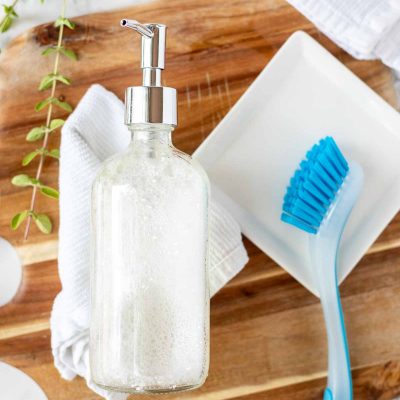
Homemade Dish Soap
Save This Recipe
Equipment
- Measuring cup and spoons
Ingredients
- 3/4 cup distilled water or water that was boiled and cooled
- 1/2 cup sals suds
- 2 tbs whtie vinegar
- 1 tbs vegetable glycerin
- 20 drops essential oils
Instructions
- If not using distilled water, boil water for a few minutes and then allow to cool.
- In a medium-sized bowl, combine all of the ingredients and stir well.
- Add essential oils and stir. I like to use citrus oils (like lemon) because it is tough on grease.


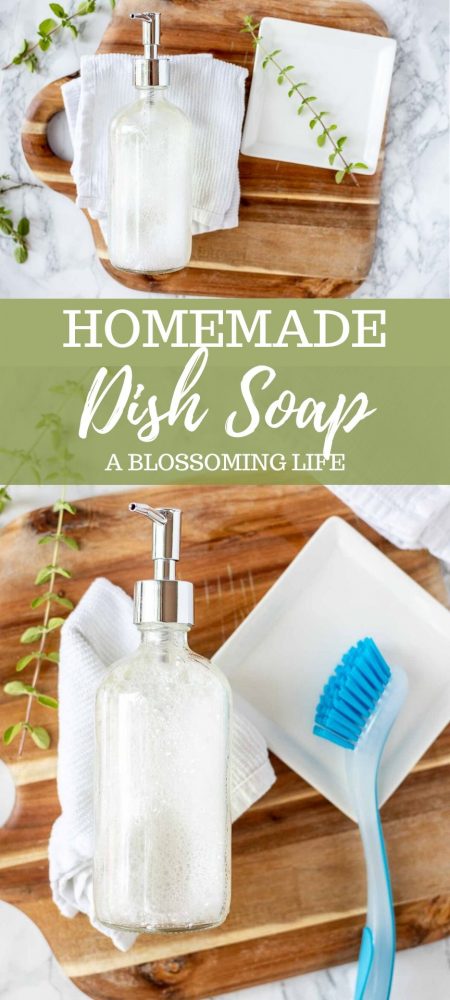
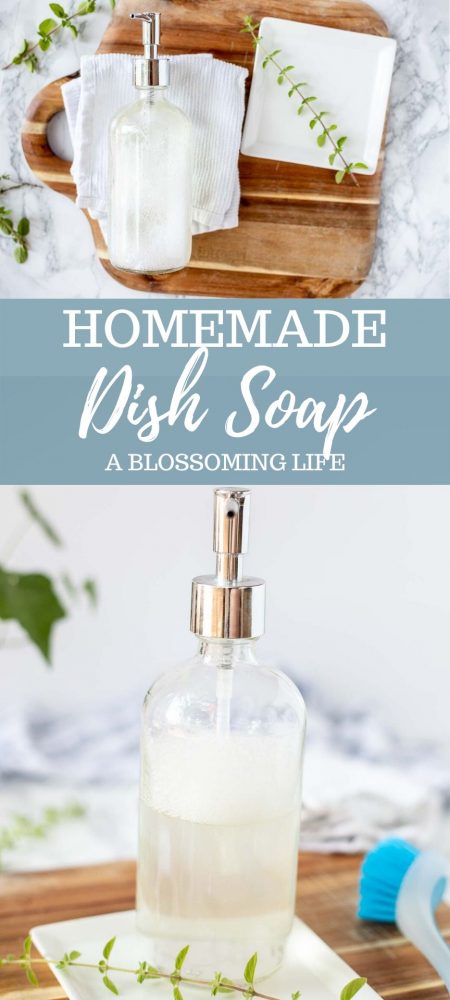
Hi, just had a question….I made this, and it is extremely thick….is there something I can add to it to thin it out? Thanks,
you may try boiling it again and/or add some more glycerin
Does it have to be shaved/grated bar soap? Could you just use liquid castile soap?
Ok, I know I can’t add lemon juice, but can I add lemon essential oil?
I have the liquid Dr. Bromners (tea tree oil) castile soap. Any suggestion for a recipe that uses that? I have 2 big bottles. 🙂 Thanks.
I think the “boogery” aspect is caused by the glycerin. Cut back/eliminate your glycerin and it will help.
Have you tried the liquid castile soap?
I wanted to comment on the acidity of lemon and orange oil. I am a doTERRA essential oil Independent Product Consultant; when using lemon and orange look to see if it was cold pressed. Cold pressing is when the skin/peel of the citrus fruits are pressed to extract the oil. Lemon juice and orange juice are acidic, however, cold pressed oils from the peel of the lemon and orange are not! We take lemon essential oil internally to flush out toxins and to help balance our bodies’ alkaline environment. Also, remember, that all oils are not created equally. Read your labels and check out the company online, many companies claim to be pure but when you check their site you will see that there is no information available to back up that claim! I have been using the Dr. Bronner’s liquid citrus for cleaning, dishes, etc. I really love it!!
Finally a dish soap without borax and washing soda – thank you for sharing the recipe <3
Soap leaves residue. Detergents don’t, and that’s why most cleaners on the market are detergents. Soap does clean really well and you may want to add some vinegar to your rinse water and don’t use too much soap. Also, wash your less dirty dishes first, then the heavier soiled/greasy stuff last. If your water is really greasy, then perhaps you need to dump the water and put in fresh to wash the really greasy dishes at the end.
When I moved I could only find my Dr. Bronner’s liquid soap for the first week so that’s what I used to bathe with, do dishes with, and washed the laundry with it. I loved it but it’s WAY too expensive purchased as a liquid to use this way all the time. Over time it can build a film. That’s why you get soap scum in your tub when you use real soap. I may have to try this recipe as castille soap and glycerin usually cleans really well.
Well, I made this and it turned out exactly as described: like thick snot. I used Dr. Bronner’s citrus soap and 20 drops of orange essential oil (which wasn’t enough, so I added 20 more drops). The extra 20 drops of EO made the soap less snot-like and more liquidy, but did not add any grease-cutting power whatsoever. In fact, I was greatly disappointed with this soap. It did not clean well, and the grease floated around the top of the water line, so everything was still greasy and dirty after washing. I had to use a LOT of it to get a little bit of cleaning power. It also leaves white splotches on the dishes, and I have never had white splotches on my dishes after washing before, so it’s not the water. 🙁
The same thing happened to me. I consider this ‘recipe’ a waste of time and money.
can’t wait to try this one this summer with the kiddos
Mine ended up way too thick–a jello consistency. What can I do? Do I throw it out and start again? I used a bar of natural soap (not Dr. Bonar’s) and grated half of a bar of pure vegetable glycerin and melted both with the water. Is this my problem? Too much glycerin? I’d love to be able to fix what I have and still use it.
Just add water until it’s the consistency you want.
what does this soap end up smelling like? I see citrus, and then tree oil– I have no idea what tree oil smells like
Hello,
I have had the same problem with a greasy like film from using this. I did find if I added some vinegar to the dish soap after it cools that it does help with the greasy type film. I am going to play around with this alittle and if i discover how to do with no film i will let everyone know.
I tried vinegar as well and it didn’t help at all. The Castille soap is just too greasy.
Since I’ve seen a few people had trouble getting it to thicken, just to clarify, are you using the entire 5 oz. bar of soap or 1/2 cup (4 oz) of the grated stuff with the 4 cups of water?
I only use doTERRA essential oils, so I feel perfectly comfortable using Melaleuca (tea tree) internally and certainly in this form. I would NOT ingest tea tree from any other source. I know that doTERRA uses STRINGENT testing and I know that people have been using tea tree in this manner for a long, long time. Everything is toxic in the right quantities and certainly if there are unknown byproducts/ingredients.
Just MHO.
I might try try if I find a substitute to to tea tree oil in it.
Although touted as an essential oil and antibiotic, according to the American Cancer Society: “Tea tree oil is toxic when swallowed…” If you’re washing dishes with it you are probably going to be swallowing some of it it over the long run. According to a new study from University of Western Australia, tea tree oil does not cause anti-biotic resistance in humans contrary to previous reports.
Could I add some glycerin to the recipe to make it more sudsy?
The tea tree oil I bought says it’s antiseptic. I’d imagine this isn’t safe to use. What particular brand did you buy?
All tea tree essential oil is antiseptic by nature. That’s why people use it. It’s great for zits/boils, cleaning, freshening the air, and I dilute with a carrier oil and rub it around the ears (NOT in the ears) to prevent ear infections when the kiddos are sick. What part of “antiseptic” do you find to be bad? The germ killing action is not a man made “additive”, it’s just what tea tree oil does – kills bacteria and viruses.
I found a few sources online that said it should never be ingested, in any quantity (however diluted), and was worried that it wouldn’t be the best to use on plates and cups that I would be eating/drinking out of. That’s where the concern stemmed from.
Hi Amy! Love your site and I can’t wait to try this soap. I’m now following you on twitter and pinterest and tweeting and pinning this, too.
Have a lovely day!
Neighbors About Town Blog
Thanks so much for following! I hope its works well for you!